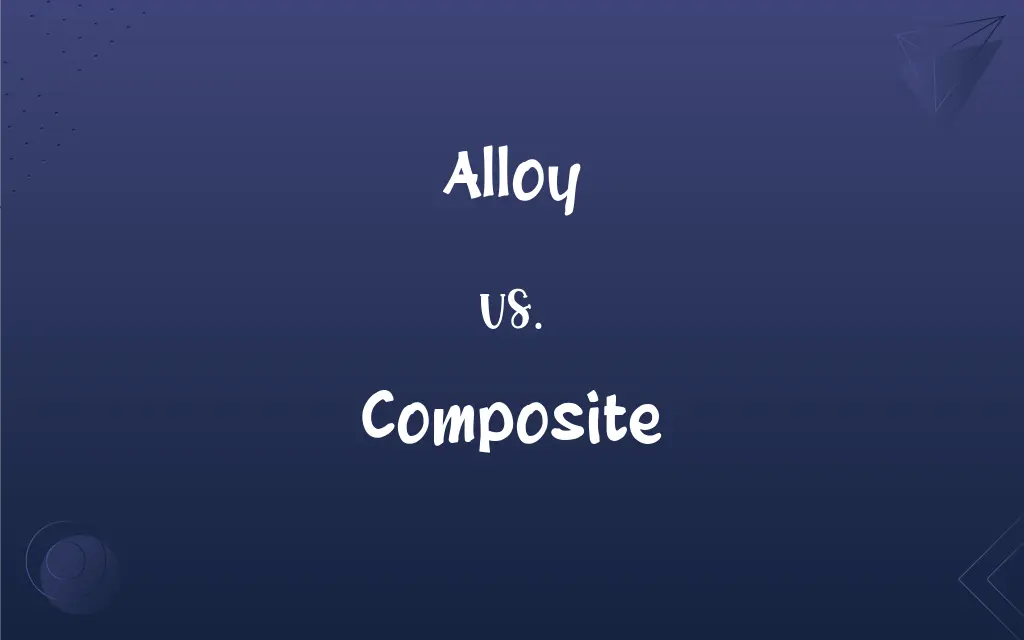Alloy vs. Composite: What's the Difference?
Edited by Aimie Carlson || By Janet White || Updated on October 12, 2023
An "Alloy" is a mixture of metals or a metal with a non-metal, while a "Composite" is a material made from two or more distinct substances that maintain their individual characteristics.

Key Differences
An "Alloy" is fundamentally a fusion of two or more metals, or of a metal and a non-metal. For instance, bronze, which is an alloy of copper and tin, merges the attributes of both metals to result in a substance with enhanced properties. Conversely, a "Composite" refers to a blend of multiple materials that, when combined, yield a new material. Importantly, these constituents in composites don't lose their individual characteristics.
"Alloy" is commonly used in contexts like metallurgy where the aim is to attain specific properties, like increased strength or resistance to corrosion. In many cases, tiny amounts of a certain element are added to a primary metal, resulting in an alloy with vastly improved properties. On the other hand, "Composite" is a broader term and can refer to a range of materials, not just metals. Examples of composites include fiberglass (glass and plastic) and concrete (cement and aggregate).
The creation of an "Alloy" often involves the melting of its components, followed by cooling and solidification. This process ensures the even distribution of elements, often at the atomic level. In contrast, "Composite" materials are typically formed by physically combining two or more components. These components, in many cases, remain physically distinct within the final composite material.
In practice, "Alloy" materials are generally homogenous on a macroscopic level, meaning they display uniform properties throughout. "Composites," in contrast, might exhibit different properties in different portions, based on the distribution and concentration of their constituent materials. For instance, a composite material may be incredibly rigid in areas dense with fibers but less so in other sections.
Comparison Chart
Composition
Metals or metal with non-metal
Two or more distinct materials
ADVERTISEMENT
Homogeneity
Generally homogenous
Constituents can remain distinct
Process of Formation
Melting and mixing
Physical combination
Example
Bronze (copper and tin)
Fiberglass (glass and plastic)
Aim
Specific enhanced properties
Combined properties of distinct materials
Alloy and Composite Definitions
Alloy
A mixture of two or more metals.
Brass is an alloy of copper and zinc.
ADVERTISEMENT
Composite
Something made up of diverse parts or elements.
The image was a composite of several photos.
Alloy
A metal combined with a small amount of non-metal to improve its properties.
Steel is an alloy of iron with carbon.
Composite
A complex material, especially one with high strength or special thermal properties, that has distinct phases.
The aerospace industry relies heavily on advanced composites.
Alloy
A metallic solid or liquid that is composed of a homogeneous mixture of two or more metals or of metals and nonmetal or metalloid elements, usually for the purpose of imparting or increasing specific characteristics or properties
Brass is an alloy of zinc and copper.
Composite
Made up of distinct components; compound.
Alloy
A mixture; an amalgam
"Television news has ... always been an alloy of journalism and show business" (Bill Moyers).
Composite
Made by combining two or more existing things, such as photographs.
Alloy
The relative degree of mixture with a base metal; fineness.
Composite
(Mathematics) Having factors; factorable.
Alloy
Something added that lowers value or purity.
Composite
(Botany) Of, belonging to, or characteristic of the composite family.
Alloy
To combine (metals) to form an alloy.
Composite
Composite(Architecture) Of, relating to, or being in the Composite order.
Alloy
To combine; mix
Idealism that was alloyed with political skill.
Composite
A structure or entity made up of distinct components
A musical suite that is a composite of operatic themes.
Alloy
To debase by the addition of an inferior element.
Composite
A material in which two or more distinct, structurally complementary materials, usually a matrix material and a reinforcing material, are combined to produce structural or functional properties not present in any individual component. Wood, bone, concrete, plastic reinforced by glass fibers, and graphite reinforced with carbon fibers are all composite materials.
Alloy
A metal that is a combination of two or more elements, at least one of which is a metal.
Composite
(Botany) A plant in the composite family.
Alloy
(archaic) A metal of lesser value, mixed with a metal of greater value.
Gold without alloy
Composite
(Mathematics) The application of one function to another. For example, if (x) = x2 and g(x) = x + 1, then the composite (g(x)) = (x + 1)2 and the composite g((x)) = x2 + 1.
Alloy
An admixture; something added which stains, taints etc.
Composite
To make using distinct components.
Alloy
(figurative) Fusion, marriage, combination.
Composite
To make by combining two or more photographs or images.
Alloy
To mix or combine; often used of metals.
Composite
Made up of multiple components; compound or complex.
Alloy
To reduce the purity of by mixing with a less valuable substance.
To alloy gold with silver or copper, or silver with copper
Composite
(architecture) Being a mixture of Ionic and Corinthian styles.
Alloy
(figurative) To impair or debase by mixture.
To alloy pleasure with misfortunes
Composite
(mathematics) Having factors other than itself and one; not prime and not one.
Alloy
Any combination or compound of metals fused together; a mixture of metals; for example, brass, which is an alloy of copper and zinc. But when mercury is one of the metals, the compound is called an amalgam.
Composite
(botany) Belonging to the Asteraceae family (formerly known as Compositae), bearing involucrate heads of many small florets.
Alloy
The quality, or comparative purity, of gold or silver; fineness.
Composite
Employing multiple exposures on a single plate, so as to create an average view of something, such as faces in physiognomy.
Composite portraiture; a composite photograph
Alloy
A baser metal mixed with a finer.
Fine silver is silver without the mixture of any baser metal. Alloy is baser metal mixed with it.
Composite
A mixture of different components.
Alloy
Admixture of anything which lessens the value or detracts from; as, no happiness is without alloy.
Composite
A structural material that gains its strength from a combination of complementary materials.
Alloy
To reduce the purity of by mixing with a less valuable substance; as, to alloy gold with silver or copper, or silver with copper.
Composite
(botany) A plant belonging to the family Asteraceae, syn. Compositae.
Alloy
To mix, as metals, so as to form a compound.
Composite
(mathematics) A function of a function.
Alloy
To abate, impair, or debase by mixture; to allay; as, to alloy pleasure with misfortunes.
Composite
(mathematics) composite number
Alloy
To form a metallic compound.
Gold and iron alloy with ease.
Composite
A drawing, photograph, etc. that combines several separate pictures or images.
Alloy
A mixture containing two or more metallic elements or metallic and nonmetallic elements usually fused together or dissolving into each other when molten;
Brass is an alloy of zinc and copper
Composite
A railway carriage with compartments for two different classes of travel; see Composite Corridor.
Alloy
The state of impairing the quality or reducing the value of something
Composite
To make a composite.
I composited an image using computer software.
Alloy
Lower in value by increasing the base-metal content
Composite
Made up of distinct parts or elements; compounded; as, a composite language.
Happiness, like air and water . . . is composite.
Alloy
Make an alloy of
Composite
Belonging to a certain order which is composed of the Ionic order grafted upon the Corinthian. It is called also the Roman or the Italic order, and is one of the five orders recognized by the Italian writers of the sixteenth century. See Capital.
Alloy
A substance with metallic properties, composed of multiple elements.
The gold alloy used in the jewelry was less prone to tarnishing.
Composite
Belonging to the order Compositæ; bearing involucrate heads of many small florets, as the daisy, thistle, and dandelion.
Alloy
A blend designed to have enhanced characteristics or qualities.
The aircraft's alloy offered better resistance to high temperatures.
Composite
That which is made up of parts or compounded of several elements; composition; combination; compound.
Alloy
A metallic substance that differs from a pure elemental form.
The scientist studied the properties of a new aluminum alloy.
Composite
A conceptual whole made up of complicated and related parts;
The complex of shopping malls, houses, and roads created a new town
Composite
Considered the most highly evolved dicotyledonous plants, characterized by florets arranged in dense heads that resemble single flowers
Composite
Consisting of separate interconnected parts
Composite
Of or relating to or belonging to the plant family Compositae
Composite
Used of color
Composite
A modified Corinthian style of architecture (a combination of Corinthian and Ionic)
Composite
A material made from two or more different substances that retain their individual properties.
The boat's hull was made of a strong composite material.
Composite
A combination of various distinct elements.
The artist used a composite of materials to create the sculpture.
Composite
A blend of various components resulting in a final product with enhanced characteristics.
The composite decking resisted weathering better than traditional wood.
FAQs
What is an Alloy typically made of?
An alloy is a mixture of two or more metals or a metal with a non-metal.
Can a composite material be used in construction?
Yes, for instance, concrete is a composite of cement and aggregate.
Is stainless steel an example of an alloy?
Yes, stainless steel is an alloy of iron with carbon and chromium.
Why are alloys important in industries?
Alloys can offer improved properties like strength, corrosion resistance, or workability.
Are the materials in a composite fused together?
No, materials in a composite retain their individual characteristics.
Is gold jewelry often an alloy?
Yes, gold jewelry often contains alloys to enhance durability.
Do composites always involve metals?
No, composites can be made from a range of materials, not just metals.
Are alloys generally uniform in nature?
Yes, alloys are usually homogenous on a macroscopic level.
Can the properties of metals be enhanced with alloys?
Yes, alloys often aim to enhance specific properties like strength or resistance.
Are composites used in aerospace?
Yes, advanced composites are crucial in aerospace for their strength-to-weight ratios.
Do composites offer the benefits of all their constituent materials?
Often, composites aim to combine the advantageous properties of their individual components.
Do all metals form alloys?
Not all metals, but many metals can form alloys with specific properties.
What's a notable feature of composites?
Composites are characterized by components that remain distinct within the final material.
Can composites be naturally occurring?
While many are man-made, there are naturally occurring composites like wood.
Can a composite be made of three or more materials?
Yes, a composite can be made up of multiple distinct substances.
Are alloys usually created by melting their components together?
Generally, yes, alloys often involve melting and mixing of components.
Is a composite's strength always the sum of its parts?
Not necessarily; the combined strength depends on the interaction of its components.
Is fiberglass an example of a composite?
Yes, fiberglass is a composite of glass fibers and plastic.
Can alloys resist corrosion?
Certain alloys, like stainless steel, are designed to resist corrosion.
Is bronze an example of an alloy?
Yes, bronze is an alloy of copper and tin.
About Author
Written by
Janet WhiteJanet White has been an esteemed writer and blogger for Difference Wiki. Holding a Master's degree in Science and Medical Journalism from the prestigious Boston University, she has consistently demonstrated her expertise and passion for her field. When she's not immersed in her work, Janet relishes her time exercising, delving into a good book, and cherishing moments with friends and family.
Edited by
Aimie CarlsonAimie Carlson, holding a master's degree in English literature, is a fervent English language enthusiast. She lends her writing talents to Difference Wiki, a prominent website that specializes in comparisons, offering readers insightful analyses that both captivate and inform.































































